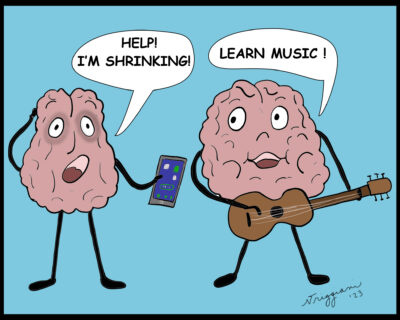The benefits of playing a musical instrument, especially for brain development, have been studied and touted for years. From building brain power in young children to boosting memory in aging adults, music’s benefits span the generations.

What is so unique is that music engages the entire brain, activating and synchronizing the various regions and strengthening the neural pathways between them. The auditory cortex, responsible for deciphering sounds, the motor cortex that controls body movement, the prefrontal cortex that presides over cognition and emotion, and the hippocampus, the memory bank, are all awakened and join forces in a full-brain workout when playing a musical instrument.

Music has additional benefits in modern society dominated by digital devices and artificial intelligence. This is no longer the world of Mozart, who walked the cobblestone streets of Salzburg, Austria, in the 1700s and composed great masterpieces by candlelight. The world made a sharp turn, changing forever, when the tech boom burst on the scenes. The pivotal year was 2007 when the iPhone was first introduced, making recently developed Facebook, Twitter, and YouTube mobile and global. Netflix streaming was launched and IMB was developing the super-computer, Watson, ushering in an era of Artificial Intelligence.
While the advent of these new technologies has been advantageous in many ways, particularly with information sharing, adverse side effects on mental and physical health are surfacing. People, young and old, are tethered to their digital devices and living their lives through screens, disengaged from the real world. The resulting negative impacts of excessive screen time on health are many and music may be the perfect antidote!
The average screen time for a child in the United States ranges from 4 to 9 hours per day. This takes into account computers, phones, tablets, and television. Long term sensory overload from screens alters the chemistry, neural synapses, mass, and general function of the brain, reducing the ability to focus and retain information. Additionally, spending a large percentage of time in front of a screen doesn’t allow a child enough time to interact with others on a personal level, or with the environment, both of which are essential for social growth and development.
One alarming side effect is anxiety and depression. Children who spend 7 hours a day staring into a screen are twice as likely to suffer from mental health issues. Their minds don’t have enough quiet time or time to think and reflect due to the prolonged, constant overstimulation.
Adding to the anxiety is social media, which has become a vehicle for cyber bullying. Through social media children harass and ridicule others. This has taken bullying to a higher, more dangerous level. A quick text or post sent through Instagram, Snapchat or any other platform instantly spreads the attack far beyond the school playground, the classroom, or those close enough to witness it. The reach is staggering.
Perhaps most startling is that studies using brain scans revealed excessive screen time actually shrinks the gray matter, the cognitive part of the brain, while simultaneously deforming the white matter, which functions as a neural pathway. Brain MRI studies also show a premature thinning of the cerebral cortex in children as young as 9 years old. This is essentially brain atrophy, which is responsible for decreased cognition and critical thinking, and for the lack of impulse and behavioral control.
Spending a lot of time in front of electronic screens also disrupts sleep cycles and causes hormonal imbalances by inhibiting or promoting the release of melatonin and dopamine. The release of dopamine, known as the “reward” chemical, is triggered by computer games, and makes one feel pleasure. The more pleasure one has, the more one wants, and this leads to addiction in a similar way that drug addiction works.
Not only the brain is suffering. Being sedentary before electronic screens causes the body to atrophy. Muscles are not being worked, the heart and lungs don’t pump as rigorously, and the result is poor physical conditioning and weight gain. A weakened, overweight body is a host for diseases, such as diabetes, which has been increasing at alarming rates in children since the early 2000s.
The good news is there’s a remedy – music! Music has been soothing souls since the days of the cave dwellers. As screen time reduces brain size, playing a musical instrument pumps it back up. All the senses are involved: hearing the vibrations of the notes, feeling the instrument in your hands, seeing and reading the sheet music, and experiencing the emotions the music evokes. Music is also directly related to the nervous system that controls not only brain function but also blood pressure and heart rate.
The same type of brain scans, MRIs, that showed a reduction in brain size as related to abundant screen time, were also used to analyze brains of musicians. The findings were the exact opposite. The areas of the brain linked to auditory, visual, and motor skills were larger and more developed. Enhanced development in these brain regions go beyond the ability to make music and have a positive impact on everyday life.
A more developed auditory system enables a person to process sound and speech better. This translates into higher reading levels and better communication skills. The motor cortex of musicians has more neurons controlling fine motors skills, making musicians very in control of their bodies.

Music not only enlarges the size of the gray matter but also synchronizes the brain’s regions to work in concert with one another. The prefrontal cortex, motor cortex, auditory cortex, and somatosensory region share information on a superhighway of neurons and synapses, firing in both directions, making for a more efficient and faster functioning brain.
Time spent learning to play an instrument, practicing, and playing music with others, means less time absorbed in a digital screen. This translates into more time mentally and physically engaged in the real world, regenerating and growing.
The digital world is here to stay and we should use it judiciously to access knowledge, become more productive, and connect with people from afar. However, spending endless hours hunched over a smart phone might not be the smartest thing for your physical and mental health. To be truly productive, developed, and fulfilled as an individual, one must seek balance in life. Learning music is the ideal counterbalance to the modern-day digital ills brought on by excessive screen time.
Maybe it really is time to return to the days of Mozart, stretch your legs, breathe in the fresh air, and engage your brain and body, your whole self, in music. Music will give back what screen time takes away.
